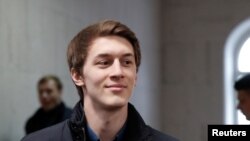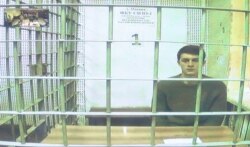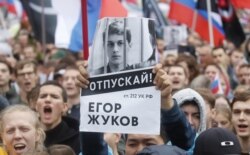In the swirl of protests in Moscow this summer against a political system that many deem repressive, an eloquent 21-year-old political science student stood out.
Yegor Zhukov, who studies at Moscow's prestigious Higher School of Economics, has drawn a sizable audience on his YouTube channel. In a series of video blogs, he has railed against President Vladimir Putin, promoting opposition protests across the country.
Zhukov was arrested before dawn Aug. 2. Since then, his videos have garnered hundreds of thousands of views — more than 300,000 as of Thursday.
Sentenced Friday
Zhukov faced up to four years in prison, but Friday a Moscow court handed down a three-year suspended sentence after finding him guilty of inciting extremism online.
The Kuntsevo District Court in western Moscow also banned him from administering websites for two years.
He was initially charged with mass unrest as a result of his participation in the protests. But amid an outcry from student supporters, prosecutors reclassified the case against him.
In his final court appearance on Thursday, Zhukov offered a blistering indictment of the arbitrariness of Russia's political system.
"The state has made it clear. 'Guys, you can wander around in your mink coats, just don't interact with each other. More than two of you aren't allowed to gather on the street. We'll put you in jail for holding a demonstration. You're not allowed to work together on some socially beneficial project. We'll label you a foreign agent.' Where does trust come from in such an environment?" he said.
Zhukov joins a growing list of prominent individuals, which includes Nobel laureate poet Joseph Brodsky, Ukrainian filmmaker Oleg Sentsov and former Russian economics minister Alexei Ulyukayev, whose eloquent courtroom statements over the decades have captured the Russian imagination.
Russia's current political system has fostered economic inequality that Zhukov says destroys any opportunity for human prosperity, with the top 10% holding 90% of the nation's wealth.
'Banal corruption'
"Among them, of course, there are very honorable citizens. But the bulk of this wealth was obtained not by honest labor for the benefit of people, but by banal corruption," Zhukov said. "Our society is divided into two levels by an impenetrable barrier. All money is concentrated at the top, and nobody from there will give it back. From the bottom, without exaggeration, only hopelessness remains."
In protests that clogged Moscow's streets on consecutive weekends, police arrested dozens of people on various charges. Most were released for minor misdemeanor violations.
But more than two dozen protesters have been prosecuted on more serious charges. Several have received what their supporters said were disproportionately harsh sentences.
In court on Thursday, Zhukov claimed the government had "dehumanized" Russians, resulting in "an attitude that is highlighted every day by beatings with truncheons, torture in prisons, ignoring the HIV epidemic, closing schools and hospitals."
"Russia is gradually disappearing at an average rate of 400,000 people a year," he said. "You don't see the people behind the statistics. So, go find out who they really are! It's those [who] drink out of helplessness. It's those freezing in cold hospitals. It's those killed by someone else. It's those who are killing themselves."
Still, Zhukov said he was optimistic for the future.
"I look forward beyond the horizon, years ahead, and see Russia filled with responsible and loving people, where there will be a truly happy place," he said. "Let everyone imagine such a Russia. Let this image guide you in your work in the same way that it guides me."






